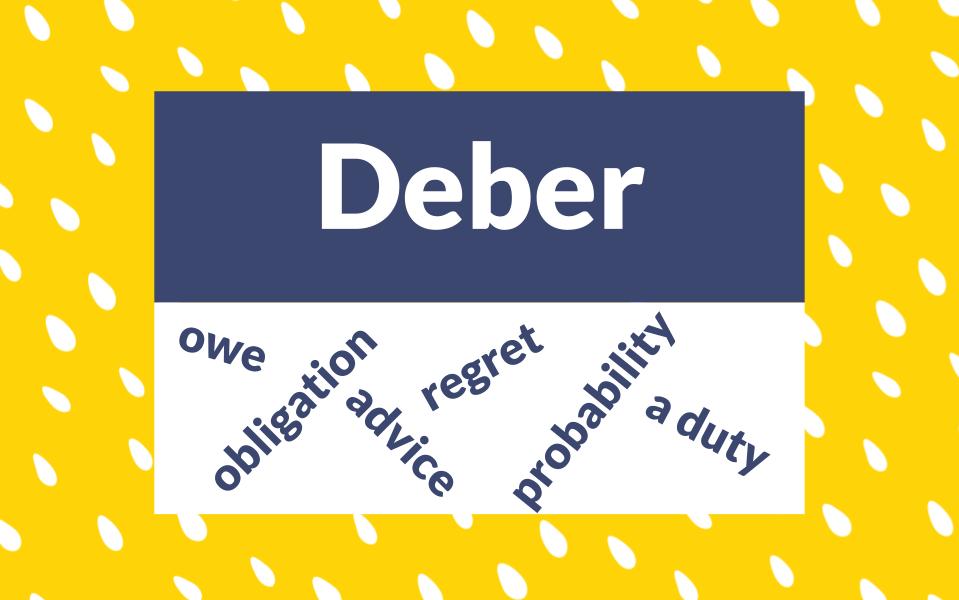Deber: Conjugation, Meaning, Use, and More!

Get our free email course, Shortcut to Conversational.
Have conversations faster, understand people when they speak fast, and other tested tips to learn faster.
More infoThe verb deber in English can mean must, should, to owe, and, when used as a noun, can describe one’s duty.
Deber in Spanish as a verb is used to express obligations, give advice, or offer suggestions. In this case, it’s vital to know the right deber conjugation to get the point across. Other circumstances when we might use deber include talking about something you owe, talking about regret in the past, or talking about a supposition or probability of what “must have” happened.
Even though deber is usually used as a verb, it can be used as a noun, too. When used with an article, el deber is probably being used as a noun and thus translates to duty.
The majority of the time though, when we use deber we’re looking to correctly conjugate and use it as a verb. So we’ll start off here with some of the most common deber conjugations, and then get into the various ways to interpret deber in English.
Deber Conjugation
| Subject | Present Indicative | Conditional | Imperfect | Preterite |
| Yo | debo | debería | debía | debí |
| Tú | debes | deberías | debías | debiste |
| Él, Ella, Usted | debe | debería | debía | debió |
| Nosotros/as | debemos | deberíamos | debíamos | debimos |
| Vosotros/as | debéis | deberíais | debíais | debisteis |
| Ellos, Ellas, Ustedes | deben | deberían | debían | debieron |
Deber to Express Obligation or Responsibility: Have to or Need to
When we “have to” or “need to” do something, we use the verb deber in Spanish to communicate this obligation or responsibility.
Using deber in this way is a straightforward structure of deber + infinitive: simply conjugate deber to match the tense and subject you’re using, and follow it up with the infinitive form of your next verb.
- You must finish the essay by tomorrow. – Debes terminar el ensayo para mañana.
- We must find the solution as soon as possible. – Debemos encontrar la solución en cuanto antes.
- Camila is very sick; the doctor says she must do a blood test. – Camila está muy enferma; el doctor dice que debe tomarse un examen de sangre.
Tener que + infinitive and Hay que + infinitive
Though it is among the most common, deber is not the only way to express obligations in Spanish. We can also use tener que and haber que for the same purpose.
The steps for using tener que or haber que are exactly the same as they are for deber: simply conjugate the first verb based on your subject and tense, followed by the word que, before placing it in front of an infinitive.
Just note that haber que almost always conjugates to hay que and is used without a specific subject to express a general obligation that doesn’t fall on any one person in particular.
- I have to work this Sunday. – Este domingo tengo que trabajar.
- The house is a mess. It’s time to clean up. – La casa está hecha un desastre, hay que limpiar.
For a thorough explanation on these alternatives, check out our detailed post on using hay que vs tener que.
Deber to Give Advice: Should
Using deber in the conditional form (debería) softens its meaning. So while deber means must, debería means should.
As a result, when you see an example of a deber conjugation in the conditional, you can assume it’s used not to express obligation, but rather to express a piece of advice or a suggestion.
The conditional form still follows the same rules as other tenses: it will always be conjugated to match your subject and followed by an infinitive verb.
- You should take an umbrella with you, it looks like it’s going to rain. – Deberías llevar sombrilla, parece que va a llover.
- They shouldn’t go out so late, it can be dangerous. – Ellos no deberían salir tan tarde, puede ser peligroso.
- We should get her something nice for her birthday; she deserves it. – Deberíamos comprarle algo lindo para su cumpleaños; se lo merece.
Deber to Express Regret: Should have
When you want to express regret or reproach for not having done something in the past, you can use the verb deber, too. In this case, we use the deber conjugation in preterite and add a verb in the infinitive.
- I should have bought the computer yesterday and taken advantage of the discount. – Debí comprar el computador ayer y aprovechar el descuento.
- You should have followed my advice; it is too late to make things right. – Debiste seguir mi consejo, ya es muy tarde para arreglar la situación.
- Juan should have told the truth. Nobody believes him now. – Juan debió decir la verdad, ahora nadie le cree.
Deber to Express Owing Something
Deber also communicates the obligation to pay for something, or to owe something or someone.
To use deber this way we use the formula of deber + noun: we’ll first choose the right deber conjugation according to the subject and tense, and follow it with the thing we owe.
- My sister owes a lot of money to the bank. – Mi hermana le debe mucho dinero al banco.
- I’m sorry, I owed you an apology, and I never gave it to you. – Lo siento, yo te debía una disculpa y nunca te la di.
- You owe me an explanation for what happened yesterday. – Tú me debes una explicación por lo que pasó ayer.
Deber to Express Supposition or Probability
If you want to communicate supposition or probability, use deber accompanied by the Spanish preposition de and a verb in the infinitive. In this form of deber + de + infinitive, deber de generally translates as must or must be in English.
- He must be a foreigner; he hardly speaks Spanish. – Debe de ser extranjero; casi no habla español.
- They must be at home because the lights are on. – Deben de estar en casa porque las luces están prendidas.
- She participated in a cooking contest, she must cook really well. – Participó en un concurso de cocina, debe de cocinar muy bien.
Deber as a Noun: Duty
Deber may also be used as a noun whose meaning in English is duty or obligation.
- It was my duty to take care of you when you were sick. – Era mi deber cuidarte cuando estabas enferma.
- We have a duty to take care of the planet – Tenemos el deber de cuidar el planeta.
- Your duty as a doctor is to help your patients. – Su deber como doctor es ayudar a sus pacientes.
Conclusion
When you need to express obligation or responsibility in Spanish, deber is your best friend. It’s one of the most commonly-used and simplest ways to communicate things like regret, advice, supposition, and probability.
As a regular verb that’s typically followed by an infinitive, deber doesn’t require you to remember things like stem changes or irregular conjugations. You just choose the right deber conjugation and add an infinitive for most of its uses!



